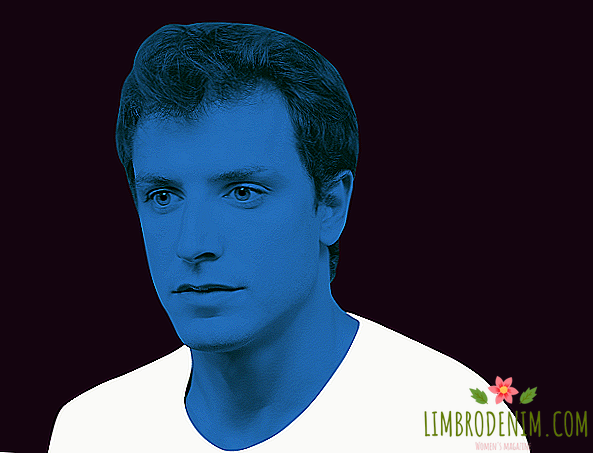Curator Anna Zhurba about favorite books
IN BACKGROUND "BOOK SHELF" we ask journalists, writers, scholars, curators, and anyone else not about their literary preferences and publications, which occupy an important place in their bookcase. Today, the curator and employee of the exhibition department of the Moscow Museum of Modern Art Anna Zhurba shares her stories about favorite books.

I still remember how my mother taught me to read. My first book was Gulliver's Travels. I cannot say that I was very happy about this initiative then - instead of walking with friends in the courtyard, it was necessary to put syllables into words, which brought me to tears. The class teacher and part-time teacher of Russian and literature, possessing unique knowledge, very demanding and demanding infinite respect, helped me to really love reading. I don’t remember that in our lessons we even opened a literature textbook at least once, which, it seems to me, saved our heads from filling them with clichés and common spaces. Every summer we had to read all the literature for the next year, and during the year we read it again. Natalia Vyacheslavovna gave us much more school curriculum and was attentive to our opinions - I still consider that experience as the most important meeting with a teacher in my life.
I learned to read and study texts independently in a magistracy at Goldsmith College in London. Then I found myself in the educational system, where you have 2-3 lectures a week, and you spend all the rest of the time in the library, left to yourself, or not. For me, this was a turning point, I really mastered independent reading (of course, this applies to non-fiction). That year I read many texts that changed my view of the world.
As for fiction, ideas about what can be read come to me from a variety of sources. I really trust my friends on this issue and rarely give up on it. Often I find books on a chain - at the mention of them in other books or by other people who are cute to me. I remember how I stumbled upon one of my now favorite books - “The Story of the Eye” by Bataille. I then listened a lot to the band Of Montreal and on the line “Standing at a Swedish festival discussing„ Story of the eye ““ I thought - probably something very cool was discussed at the Swedish festival.
I do not fully understand the admiration (especially of my foreign friends) Dostoevsky, his language seems too simple to me - it is immediately clear that he wrote in conditions of tight timing. I never trust lists like "100 greatest masterpieces of literature," or something like that, I believe that the right books come into your life. And it seems to me that for every book there is a time. It often happens that I start reading something and there is no contact, and then I can return to it in a year and read it in a few days.
Probably, I can be considered a bibliophile - from each trip I quote half a box of books. Unfortunately, many books of interest to me will not soon be translated into Russian, although publishers who publish translations of critical theory and philosophy seem to me to be real wizards and the best people on earth. I really appreciate their dedication to this difficult task. Basically, I buy albums of my favorite artists and books on theory, they are given to me and brought from travels by acquaintances, the need for fiction is easy to fill by exchanging books with friends.
At home I have a large enough bookshelf, when I look at it, I think with horror about moving - it would be almost as difficult for me to leave books as friends and relatives. Therefore, I am very sorry that I like the materiality of the book. I understand that the Kindle is very convenient and practical, but I love to turn the pages too much and inhale the smell of fresh print. I almost always read with a pencil - even fiction, so holding the book in my hands seems to me an important and enjoyable process.
I really like vacation, because this is the time when you can concentrate on reading, and not read frantically in transport, or at breakfast, or before bedtime. Sometimes (as was the case with many books from the list), if the book fascinates me, I don’t want to do anything more than read, which, of course, is dangerous for the rest of my life. It so happened that I now read about fiction and non-fiction about in equal proportion. Unfortunately, fiction basically has to be read in fragments (on the road), for non-fiction, I try to set aside some time at home to read it with a pen, paper and computer.

Chris Kraus
"I Love Dick"
This book was presented to me by a friend just a year ago, but now it seems that I have lived with her for a lifetime. Lena then said that I definitely need to read this book. I would advise her to everyone, and especially to girls. Chris Kraus is the editor of an almost perfect Semiotext (e) publisher, a professor of CalArts, and a part-time woman who is trying to find herself in the world of men. The difficulties she faces on this path are one of the central themes of the book. In fact, this is the autobiography of her love relationship with two men - her husband and his colleague, with whom she unexpectedly falls in love.
It seems the plot smacks of banality, but no. First, the relationship in this love triangle develops in the best traditions of the Silver Age, adjusted for the fact that it happens in the late 90s. Secondly, Kraus writes unusually frankly and hysterically, forcing the reader to re-analyze his own painful experience of the past. And all this is seasoned with incredibly thin fragments of art criticism and analysis of cultural phenomena, most often referring again to the female voice in culture. After reading it seems that you already know this person well and she told her story to you personally.
Luce Irigaray
"This Sex Which Is Not One"
The love of texts by Luce Irigarey happened to me from the first pages. At that moment I studied in a magistracy and felt a strong estrangement towards many philosophical texts because of their tightness and rigidity, and also the fear that I would never understand them. When, as part of the introductory course, we were offered the text by Irigari, it was like a breath of fresh air. Her writing style in most texts resembles poetry and often refers to sensual experience, rather than logical algorithms.
In addition, one of the central themes of Irigari - harmonious coexistence with another and love in the broadest sense of the word - always seemed to me the most important and necessary in modern philosophy. In my opinion, such books can say much more about the world of men and women and their intersection than popular psychology and glossy magazines, so it is especially pitiful that not much has been translated into Russian. It seems to me that it is difficult to overestimate the contribution of Luce Irigarey to the formation of an understanding that a woman has her unique voice, which should not strive to resemble a man’s.
Roland Barth
"Camera Lucida"
I love all the lyrics of Bart simply because reading them is always interesting, whatever their subject: advertising, love discourse or photography. Photography has never been my favorite art form, but theoretical books about it are always very interesting to read. Here I would advise at least “A brief history of photography” by Benjamin and the book Sontag “We look at the suffering of others.”
"Camera Lucida" was a revelation to me because it was written very personally - the text of Bart directly shines through the text. All this makes his very deep observations about the nature of photography into a practically personal conversation with the author. While reading a book, in some places it is difficult to keep from smiling and tears. In addition, now "Camera Lucida" is also read as a book about time. I don’t remember when I last saw the printed photos, so the narration in the pictures from the family album, which is carefully preserved and the revision of which is a kind of ritual, gave me a aching feeling of sadness about something good that progress and civilization squeeze out of our daily life .
Orhan Pamuk
"Museum of Innocence"
In fact, here I could talk about any Pamuk novel. Despite the infinite love of French literature and philosophy, it is becoming more and more interesting for me to read books written by non-Europeans, even those who have long moved to the West. With Pamuk, of course, a separate story altogether. First of all, I admire his love and devotion to Istanbul; probably, I kind of associate myself with him because of the never-ending love of his native St. Petersburg. Secondly, Pamuk's attentiveness to details creates such strong images that all his books in my head immediately turn into a movie, and a completely different level of empathy arises for the heroes.
The Museum of Innocence is one of the most beautiful books about love and that life may not be the way you imagined it. I remember that when I read it, I did not want to eat or sleep, and in general to force myself to do something besides reading was very difficult. This is such a long version of Bunin's story "Cold Autumn", which since childhood was stuck in my head.
Renata Salezl
"(From) the rotation of love and hate"
Renata Saletsl - a real example to follow. Her books are interesting to read, her lectures are incredibly interesting to listen to, despite the long years at the academy, her mind is absolutely not ossified, did not stand on some well-studied rails, her view of the world is extremely broad and diverse. In addition, like her compatriot Slava Zizek, in her texts Salezl, analyzing complex issues, without fear refers to popular culture, which makes its potential audience wider.
"(From) the rotation of love and hate" is for me practically an encyclopedia of modern life, because in one small book, Salzel discusses the nature of romantic relationships (and lays them out from the point of view of the psychoanalyst so much that I want to shout: "I thought so! why? "), the relationship between man and animals, the dictator's psychology, the concept of the Other, and even female circumcision. When Salezl, named in the 2000s as the most influential woman in Slovenia, in her Issey Miyake costume, makes the audience think and laugh at the same time, involuntarily think that, perhaps, there are unique role models.
Kate zambreno
"Heroines"
Zambreno hasn’t written very much so far, but this book of hers (published by the very publishing house Semiotext (e), which Kraus deals with) sounded very loud. In essence, this is the confession of the writer herself, who is still the same as Kraus, the problems of finding one's creative voice and self-realization in a life situation with a man, for whose self-realization one must (or shouldn’t?) Compromise with oneself and one’s own interests. She incorporates this personal story into her research about the wives of great writers and the reasoning about the undervaluedness of their own talent. Among the heroines of Zambreno are Vivienne Eliot, Jane Bowles, Jean Rees and Zelda Fitzgerald. The book is constructed about the same as my favorite "1913. Summer of a Century" Illies, but with the strong voice of the writer herself. In fact, “Heroines” is an alternative cultural history. This book was presented to me by a friend, and when I read it, I think that the book is really the best gift when you understand how well your friends know you.
Virginia Woolf
"At the lighthouse"
To be honest, this book is the hardest to talk about. Virginia Woolf is for me both a symbol of women's emancipation and the embodiment of women's depression and a sense of hopelessness. This is not the easiest reading, but bringing unconditional pleasure. I would say that this is a truly existential novel (written before the term itself appeared), created at a time when the old world gave way to a new and overwhelming sensation of imminent large-scale catastrophe, which soon broke out in Europe. This very piercing book is ideal for reading in a situation where nothing is incomprehensible.
Vladimir Nabokov
"Pinhole camera"
A schoolteacher of literature instilled in me a love for Nabokov. At school, Nabokov seemed to me almost a fabulous character who gathered butterflies, played tennis, lived in an incredible house with the first elevator in St. Petersburg (I highly recommend going there, if not already) and led an absolutely carefree life that after the revolution and emigration I tried to keep for his wife, Vera. Now, of course, I look at Nabokov and his works in a slightly different way, although the enthusiasm for his figure has not gone away, despite the knowledge of the difficult character of the writer, his literary snobbery and the reappraisal of the figure of the “wife of a genius”.
Nabokov is a rare exception for me - usually questions of form in art do not cling to me so much, but his literary language delays as a difficult puzzle. I love all his work, except for "Lolita" (although it is worth, perhaps, to approach her again). On the one hand, the plot "Obscura Cameras" can be categorized as "deceit and love", but on the other, a certain platitude of the plot seems to be part of Nabokov's artistic intention.
Salman Rushdie
"The earth is under her feet"
In general, I really like the way Rushdie writes, but this book is special. It can be re-read infinitely. This is another epic love story that many would call fabulous, filled with a mixture of semi-mythical, semi-religious references and American rock and roll. It seems to me that this book perfectly illustrates the harmonious interweaving of very different cultures, which has become possible only in recent decades and has completely changed our view, including about our ordinary way of life. Due to this, the novel seems very modern, reflecting to some extent the life of each of us.
Giorgio agamben
"Homo Sacer. What remains after Auschwitz: the archive and the witness"
The philosophy about man and human seems to me very important now, when human life seems no more valuable than in the Middle Ages, which we arrogantly consider dark times. That’s why I feel sincere admiration for the works of Levinas. Probably, the philosophy of Agamben can be called political, but it still retains attention to the life of an individual, which seems to me extremely valuable in any text — artistic and philosophical. Of course, a lot of books were written about concentration camps, but in his very concise research, Agamben, in my opinion, said the most important thing about them: he presented an analysis of human relationships in this absolutely inhuman context. All his texts are essentially a single entity. He is probably one of the few of our contemporaries, who offered the world his big philosophical project.




